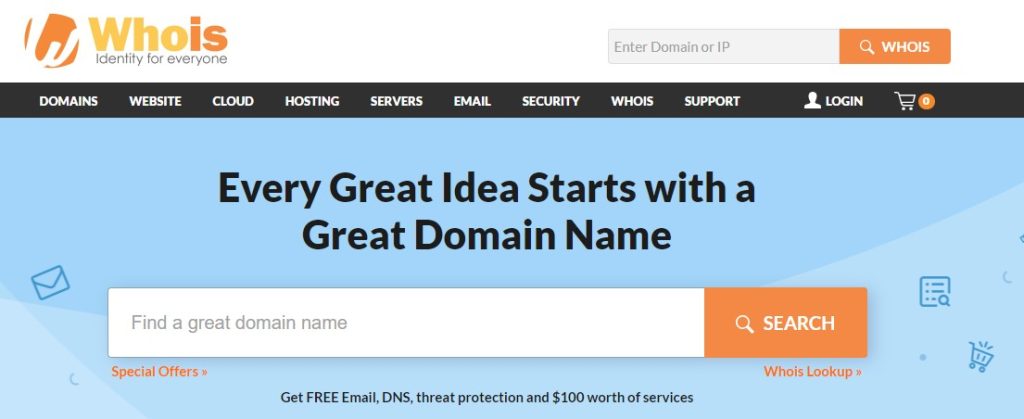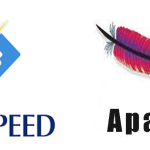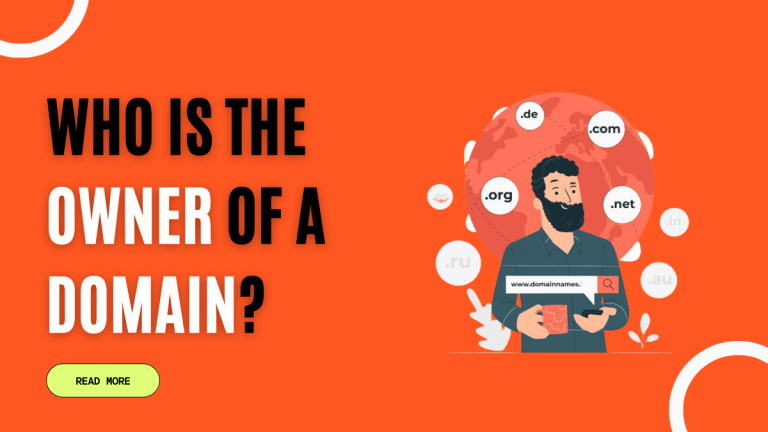In the vast world of the internet, domains are the addresses that guide us to websites. We often come across various websites, each with its unique domain name, but have you ever wondered who owns a particular domain? In this article, we will delve into the topic of domain ownership and explore the methods and tools used to determine the owner of a domain.
When we visit a website, we often focus on the content and functionality it offers. However, behind every domain lies an owner who holds the rights to that digital space. Understanding the concept of domain ownership can provide valuable insights into the online landscape.
Understanding Domain Ownership
Domain ownership refers to the legal rights and control exerted by an individual or organization over a specific domain name. It allows the owner to dictate how the domain is used and manage its associated website and email services. The owner can be an individual, a company, or any other legal entity.
Domain Registration Process
To establish ownership over a domain, individuals or organizations must go through the domain registration process. This process involves selecting a unique domain name and registering it with a domain registrar, an accredited organization responsible for managing domain registrations.
During the registration process, the domain owner provides their personal or company information, including name, address, email, and phone number. This information is collected to ensure accountability and provide a means of contact for domain-related matters.
Identifying Domain Owners through WHOIS
One way to determine the owner of a domain is by utilizing the WHOIS database. WHOIS is a protocol that allows users to query a database containing information about registered domain names. By performing a WHOIS lookup, you can retrieve details such as the domain owner’s name, organization, contact information, and registration dates.

How to Check the Owner of the Website
To check the owner of a website, you can follow these steps:
- Use WHOIS Lookup: Perform a WHOIS lookup by visiting a WHOIS lookup website or using a WHOIS lookup tool provided by domain registrars. Enter the website’s domain name (e.g., example.com) and search for the domain’s registration details. The WHOIS lookup will provide information such as the domain owner’s name, organization, contact details, and registration dates.
- Visit the Website’s Contact Page: Go to the website you want to check the ownership of and look for a “Contact” or “About Us” page. Often, websites provide contact information, including the owner’s name, email address, or phone number, on these pages.
- Explore the Website’s Footer or Legal Information: Scroll down to the bottom of the website’s pages and check the footer section or any legal information provided. Some websites mention the owner or provide details about the organization or company that operates the site.
- Check for “About” or “Author” Information: Many websites have an “About” page that provides background information about the website and its owner or authors. This page may include details about the owner’s expertise, credentials, or background.
- Look for Social Media Profiles: Check if the website or its owner has any associated social media profiles. Visit these profiles and check the bio or about section for information about the website’s owner.
- Search for Online Interviews or Press Releases: Sometimes, website owners or authors participate in interviews or release press statements. Use search engines to look for interviews or press releases related to the website or its owner, which may provide insights into the ownership.
- Contact the Website Owner: If you are unable to find the owner’s information through the above methods, you can try reaching out to the website owner directly. Look for a “Contact Us” or “Contact” page on the website and send an inquiry regarding the ownership details.
Remember that not all website owners may have their information readily available or public. In some cases, the website may be owned by a company or organization, making it more challenging to identify individual owners.
Private Domain Registration and Proxy Services
While WHOIS provides transparency regarding domain ownership, some individuals and organizations prefer to keep their information private. To address privacy concerns, domain registrars offer services like private domain registration and proxy services.
Private domain registration replaces the domain owner’s personal information with that of the registrar or a privacy protection service. Proxy services act as intermediaries, forwarding communications between the domain owner and the public while keeping the owner’s identity concealed.
Legal Entities and Ownership
In some cases, domain ownership may belong to a legal entity rather than an individual. Companies, organizations, and government bodies often register domains under their name. Identifying the owner in such cases requires researching the entity associated with the domain and understanding its organizational structure.

Ownership Transfer and Changes
Domain ownership is not static and can change hands over time. When a domain is sold or transferred to another party, the ownership details in the WHOIS database are updated accordingly. Such changes typically involve a formal process facilitated by the domain registrar or a domain transfer service.
Importance of Knowing the Domain Owner
Knowing the owner of a domain can be crucial for various reasons. It helps establish credibility and accountability, especially when interacting with a website for commercial or transactional purposes. Additionally, if any legal or copyright-related issues arise, identifying the domain owner becomes essential for resolving disputes and taking appropriate actions.
Domain Ownership and Brand Protection
For businesses and organizations, domain ownership plays a vital role in brand protection. Securing the ownership of domains related to their brand or trademarks prevents unauthorized use or misuse by others. It ensures that the brand’s online presence remains under the control of the rightful owner, minimizing the risk of reputational damage or fraudulent activities.
Read More: How to Get Namecheap Web Hosting with 50% OFF
Verifying Ownership for Website Security
Website security is a significant concern in today’s digital landscape. Verifying the ownership of a domain is a crucial step in ensuring the security of a website. By confirming that the domain is owned by the entity claiming it, potential security risks such as phishing attacks or impersonation can be mitigated.
The Role of Domain Registrars
Domain registrars serve as intermediaries between domain owners and the wider Internet community. They facilitate the registration process, maintain the WHOIS database, and provide additional services like DNS management and website hosting. Choosing a reputable domain registrar is essential for ensuring a smooth registration experience and reliable ownership records.
Tools for Discovering Domain Ownership
Several online tools and services can assist in discovering domain ownership. WHOIS lookup services are widely available and provide access to registration details. Additionally, specialized platforms offer domain history and ownership tracking, allowing users to delve deeper into a domain’s own lineage and change over time.
Challenges in Determining Ownership
Despite the availability of tools and databases, determining domain ownership can sometimes be challenging. Private domain registration and proxy services mentioned earlier can conceal the true owner’s identity. In such cases, additional investigation and research may be required to uncover the actual domain owner.
Protecting Personal Information
While domain ownership requires providing personal information, it is essential to balance privacy concerns. Domain owners must be cautious about sharing sensitive details that can potentially be misused or exploited. Opting for privacy protection services or choosing a reputable registrar with robust security measures can help protect personal information.
How to Register a Domain with Namecheap
Namecheap is a popular domain registrar known for its affordable prices, user-friendly interface, and robust features. Whether you’re a business owner, blogger, or individual looking to establish an online presence, Namecheap offers a range of domain registration options to suit your needs.
When it comes to pricing, Namecheap stands out by providing competitive rates without compromising on quality. Their domain registration prices are transparent and often lower than many other registrars in the market. They offer a wide selection of domain extensions, including popular ones like .com, .net, .org, as well as country-specific domains.
Here are some key features and benefits of Namecheap domain registration:
- Easy Domain Search and Registration: Namecheap provides a simple domain search tool on their website, allowing you to quickly check the availability of your desired domain name. Once you find an available domain, the registration process is straightforward and can be completed in just a few clicks.
- Free WHOIS Privacy Protection: Privacy is crucial when it comes to domain ownership. With Namecheap, you get free WHOIS privacy protection, which helps keep your personal information, such as your name, address, and contact details, private and protected from public view in the WHOIS database.
- DNS Management: Namecheap offers easy-to-use DNS management tools, allowing you to control your domain’s DNS settings efficiently. You can easily set up custom nameservers, manage DNS records like A, CNAME, MX, and TXT, and redirect your domain to another website or URL.
- Free Email Forwarding: Namecheap includes free email forwarding with domain registration. This feature allows you to create personalized email addresses using your domain name (e.g., [email protected]) and forward incoming emails to your existing email account.
- Advanced Security Options: Namecheap provides additional security features to safeguard your domain and website. These options include two-factor authentication (2FA) for enhanced login security, domain lock to prevent unauthorized transfers, and DNSSEC (Domain Name System Security Extensions) for protecting your domain’s DNS information.
- Reliable Customer Support: Namecheap offers reliable customer support through various channels, including live chat, email, and a knowledge base. Their support team is knowledgeable and responsive, ready to assist you with any domain-related inquiries or issues.
- Domain Marketplace and Transfers: Namecheap provides a domain marketplace where you can explore and purchase premium domain names from other owners. They also offer domain transfer services, allowing you to transfer your existing domains from other registrars to Namecheap with ease.
In conclusion, Namecheap is a reputable domain registrar that offers affordable prices, a wide range of domain extensions, and valuable features such as free WHOIS privacy protection, DNS management, and reliable customer support. Whether you’re a beginner or an experienced user, Namecheap can help you register and manage your domains efficiently while keeping costs in check.
Conclusion
Understanding domain ownership is crucial for navigating the online world effectively. Through the domain registration process, WHOIS lookups, and additional tools, we can uncover valuable information about the owners of domains. Whether it’s for legal purposes, brand protection, or website security, knowing the domain owner plays a significant role in establishing trust and ensuring a secure online experience.
FAQs (Frequently Asked Questions)
Yes, domain ownership can be transferred through a formal process facilitated by the domain registrar or a domain transfer service.
No, domain ownership can belong to individuals, companies, organizations, or other legal entities.
Some domain owners opt for private domain registration or proxy services to protect their personal information and maintain their privacy.
Yes, securing domain ownership is crucial for brand protection, preventing unauthorized use or misuse of brand-related domains.
Yes, challenges can arise due to private domain registration and proxy services that conceal the true owner’s identity. Additional research may be necessary in such cases.







